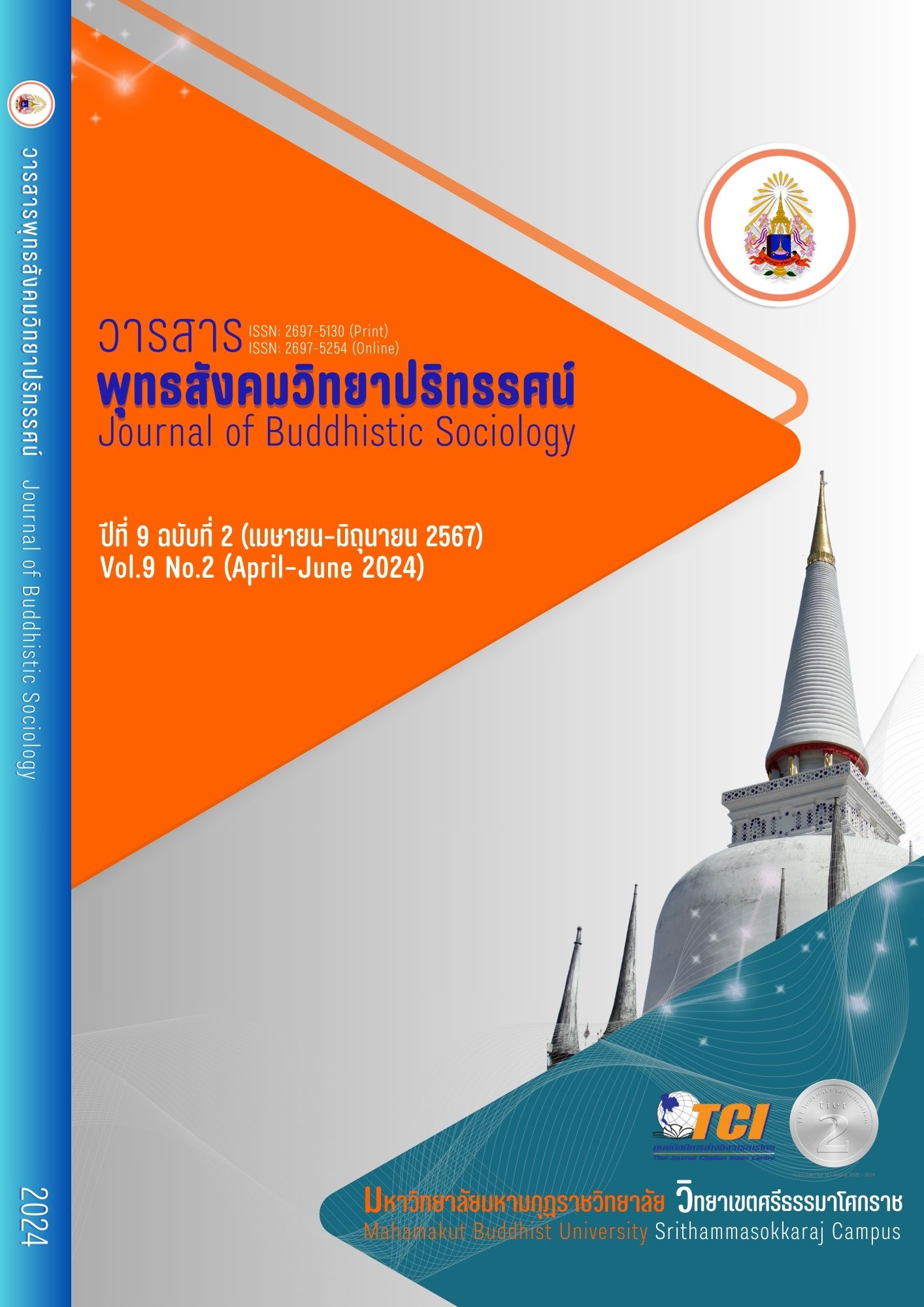COMPETENCIES OF THE NEW GENERATION OF EXECUTIVES ACCORDING TO BUDDHA BHAVANA
Main Article Content
Abstract
It is an era in which information technology systems drive everything and constantly change information, causing social conditions to change rapidly, including organizational management. Therefore, the organization that will be successful in this era must have executives with suitable competencies to develop the organization to keep pace with changes. For these reasons, the adaptation of the principles of competency for modern executives in the form of physical, mental, and knowledge is one of the tools to help develop the performance of executives to keep up with changes. Physical means the development of behavioral competencies that can be seen physically, such as being aware of the environment that affects the physical and creatively using the body in relation to the physical environment and benefit both oneself and the organization. Mental means developing mental competence to have good mental health, being ready to work and increasing the potential for effective management, responding creatively to situations that arise, and leading to systematic problem-solving. Knowing means developing knowledge competencies to be a knowledgeable person with an understanding of the various problems that arise, as a matter of fact, including applying the knowledge gained to various situations systematically and creatively.
Article Details

This work is licensed under a Creative Commons Attribution-NonCommercial-NoDerivatives 4.0 International License.
References
จีระ หงส์ลดารมภ์. (2559). สมรรถนะ: ประเภทของสมรรถนะสำหรับการบริหารในองค์กร. กรุงเทพมหานคร: โรงพิมพ์คุรุสภา ลาดพร้าว.
ชัยยนต์ เพาพาน. (2559). ผู้บริหารสถานศึกษายุคใหม่ในศตวรรษที่ 21. ใน การประชุมวิชาการระดับชาติครุศาสตร์ ครั้งที่ 1 การจัดการศึกษาเพื่อพัฒนาท้องถิ่น สู่ประชาคมอาเซียน: ทิศทางใหม่ในศตวรรษที่ 21. กาฬสินธุ์: มหาวิทยาลัยกาฬสินธุ์.
พระธรรมปิฎก (ป.อ.ปยุตฺโต). (2540). พุทธธรรมกับการพัฒนาชีวิต. กรุงเทพมหานคร: ธรรมสภา.
พระพุทธินันทน์ บุญเรือง. (2549). การพัฒนาทรัพยากรมนุษย์แบบยั่งยืนตามหลักพระพุทธศาสนา. ใน วิทยานิพนธ์ศิลปศาสตรมหาบัณฑิต. มหาวิทยาลัยราชภัฎเชียงราย.
พระสมศักดิ์ สนฺตวาโจ (สนธิกุล). (2551). การพัฒนาทรัพยากรมนุษย์เชิงพุทธตามแนวของพระพรหมคุณาภรณ์ (ป.อ.ปยุตฺโต). ใน วิทยานิพนธ์พุทธศาสตรมหาบัณฑิต. มหาวิทยาลัยจุฬาลงกรณราชวิทยาลัย.
แพรดาว สนองผัน. (2557). ทักษะของผู้บริหารสถานศึกษาในศตวรรษที่ 21 สังกัดสำนักงานเขตพื้นที่การศึกษาประถมศึกษาอุดรธานี เขต 3. ใน วิทยานิพนธ์ศึกษาศาสตรมหาบัณฑิต สาขาวิชาการบริหารศึกษา. มหาวิทยาลัยขอนแก่น.
ศศิตา เพลินจิต. (2558). ทักษะการบริหารในศตวรรษที่ 21 ของผู้บริหารสถานศึกษาขั้นพื้นฐาน สังกัดสำนักงานเขตพื้นที่การศึกษาประถมศึกษานครปฐม เขต 1. ใน วิทยานิพนธ์ปริญญามหาบัณฑิต. มหาวิทยาลัยราชภัฏกาญจนบุรี.
สำนักงานคณะกรรมการการศึกษาขั้นพื้นฐาน. (2553). คู่มือการประเมินสมรรถนะครู พ.ศ. 2553. กรุงเทพมหานคร: สำนักงานคณะกรรมการการศึกษาขั้นพื้นฐาน กระทรวงศึกษาธิการ.
สำนักงานคณะกรรมการข้าราชการพลเรือน. (2548). สมรรถนะและมาตรฐานวิชาชีพการบริหารทรัพยากรบุคคล. กรุงเทพมหานคร: พี.เอลีฟวิ่ง.
อานนท์ ศักดิ์วรวิชญ์. (2553). ความสัมพันธ์ระหว่างความคิดสร้างสรรค์ เชาว์ปัญหาและบุคลิกภาพห้าด้านตามแนวคิดของศาสตาและเมคเครของบุคคลากรทางการตลาดในประเทศไทย. ใน วิทยานิพนธ์ปริญญาศิลปศาสตรมหาบัณฑิต สาขาวิชาจิตวิทยาอุตสาหกรรมและองค์การ. มหาวิทยาลัยธรรมศาสตร์.
Basadur, M. (2008). Leading other to think Innovatly together: Creative leadership. Journal of The Leadership Quarterly, 15(1), 103-121.
David C McClelland. (1973). Testing for Competency rather than Intelligence. American Psychologist.
Rosemary Boam and Paul Sparrow. (1992). Designing and achieving competency: A competency-based approach to developing people and organizations. England: McGraw-Hill International (UK) Limited.


